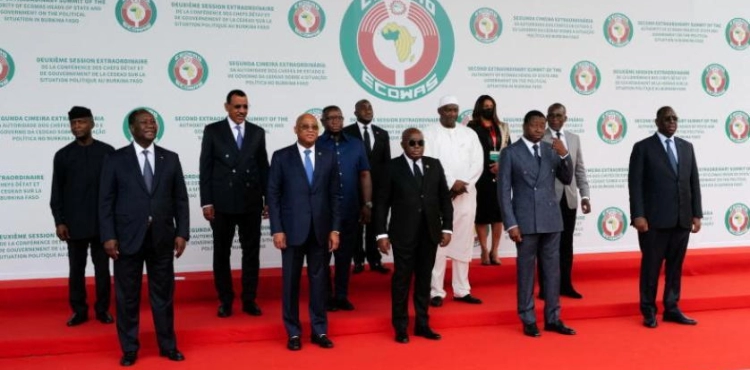West African leaders decided Sunday in Abuja to establish a regional force aimed at intervening not only against jihadists, but also in the event of coups like those that the region has witnessed in the past two years, a senior official announced.
The leaders of the member states of the Economic Community of West African States (ECOWAS) or their representatives have also given Mali´s ruling military council until January 1 to release 46 soldiers from the Ivory Coast who have been captured since July, on pain of sanctions, Omar Touray said. President of the ECOWAS Commission.
The leaders held a summit that included on its agenda the fate of these soldiers, which sparked a dangerous crisis between Mali and Ivory Coast, the two countries that are members of the group, as well as the repercussions of the coups that took place in the region in the last two years in Mali, Burkina Faso and Guinea.
"We call on the financial authorities to release the Ivory Coast soldiers no later than January 1, 2023," Omar Turay said.
A West African diplomat, speaking on condition of anonymity, told AFP that ECOWAS would impose sanctions if this did not happen. Turay also added that ECOWAS reserves the right to act if the soldiers are not released before January 1.
The West African diplomat added that the President of Togo, Faure Gnassingbe, who is doing good offices between Mali and Ivory Coast in this crisis, will go to Mali to "demand" the release of the soldiers.
Mali has been engaged in a power struggle with the Ivory Coast and ECOWAS since it arrested 49 Ivorian soldiers on July 10 upon their arrival in Bamako. Three of them have since been released.
Ivory Coast and the United Nations confirm that these soldiers were supposed to participate in ensuring the security of the German contingent operating within the international peacekeeping force in Mali, but Bamako said it considered them "mercenaries" who came to harm the security of the state. During an extraordinary summit in September, ECOWAS decided to send a high-level delegation to Mali to try to defuse the crisis. However, no progress has been made after this mission, which took place at the end of September.
Turay added that the ECOWAS leaders "decided to reset our security architecture," explaining that it was a matter of taking over "our own security" and not just outsourcing.
"They are determined to create a regional force that will intervene when necessary, whether it is a matter of security, terrorism or the restoration of constitutional order in the member states," he said.
Several countries in the region are witnessing the spread of jihadists who started from northern Mali and reached the center of this country, but also Burkina Faso and Niger, and their presence is expanding towards the south and the Gulf of Guinea. National armies are largely powerless and cooperate with outside parties, the United Nations, France or even Russia.
Insecurity is a major factor in the military coups that have rocked the region since 2020, in Mali and Burkina and for other reasons in Guinea.
Turay said that military officials from the region will meet in the second half of January to discuss mechanisms for forming the regional force.
He added that the leaders of West African countries decided, for the sake of financing, not to rely solely on voluntary contributions, which showed their limitations, without giving further details.
West African leaders also discussed the situation in Mali, Burkina Faso and Guinea, the three countries where the military has taken power by force since 2020.
The Economic Community of West African States, worried about instability or the occurrence of other coups, has been pressing for months for the return of civilians as soon as possible to power in these countries, including two, Mali and Burkina, that suffer from serious unrest due to the widening movements of jihadists. Mali and Burkina Faso were the scene of two coups in less than a year.
The three countries are suspended from membership in the decision-making bodies of ECOWAS.
Under pressure, the military pledged to relinquish power within two years and after a transitional period, during which they say they want to "reform" their country.
West African leaders discussed the measures taken by some on the road to what they call "a return to constitutional order."
In Mali, "constitutional order must be restored as soon as possible," said Touray. And if the March 2024 date is respected after months of disagreement with the Economic Community and a strict commercial and financial embargo that has now been lifted, the “transitional period” would have lasted three and a half years.
In Guinea, Turay urged the junta to include all parties and civil society in the process that is supposed to lead civilians to power.
The main parties and a large section of civil society boycott the offer of dialogue presented by the authorities.
As for Burkina Faso, Turay expressed "serious concern" on the part of the Economic Community of West African States regarding developments in the security situation and the humanitarian crisis.
He expressed "the desire to support Burkina Faso, which is experiencing a serious crisis."
In Burkina Faso, the new strongman, Captain Brahim Traore, has embraced the pledges of Lieutenant-Colonel Paul-Henri Sandaogo Damiba after he ousted him in September, promising in July to hold elections in July 2024 at the latest.
West African Summit decides to establish a regional force to intervene against jihadists and coups












